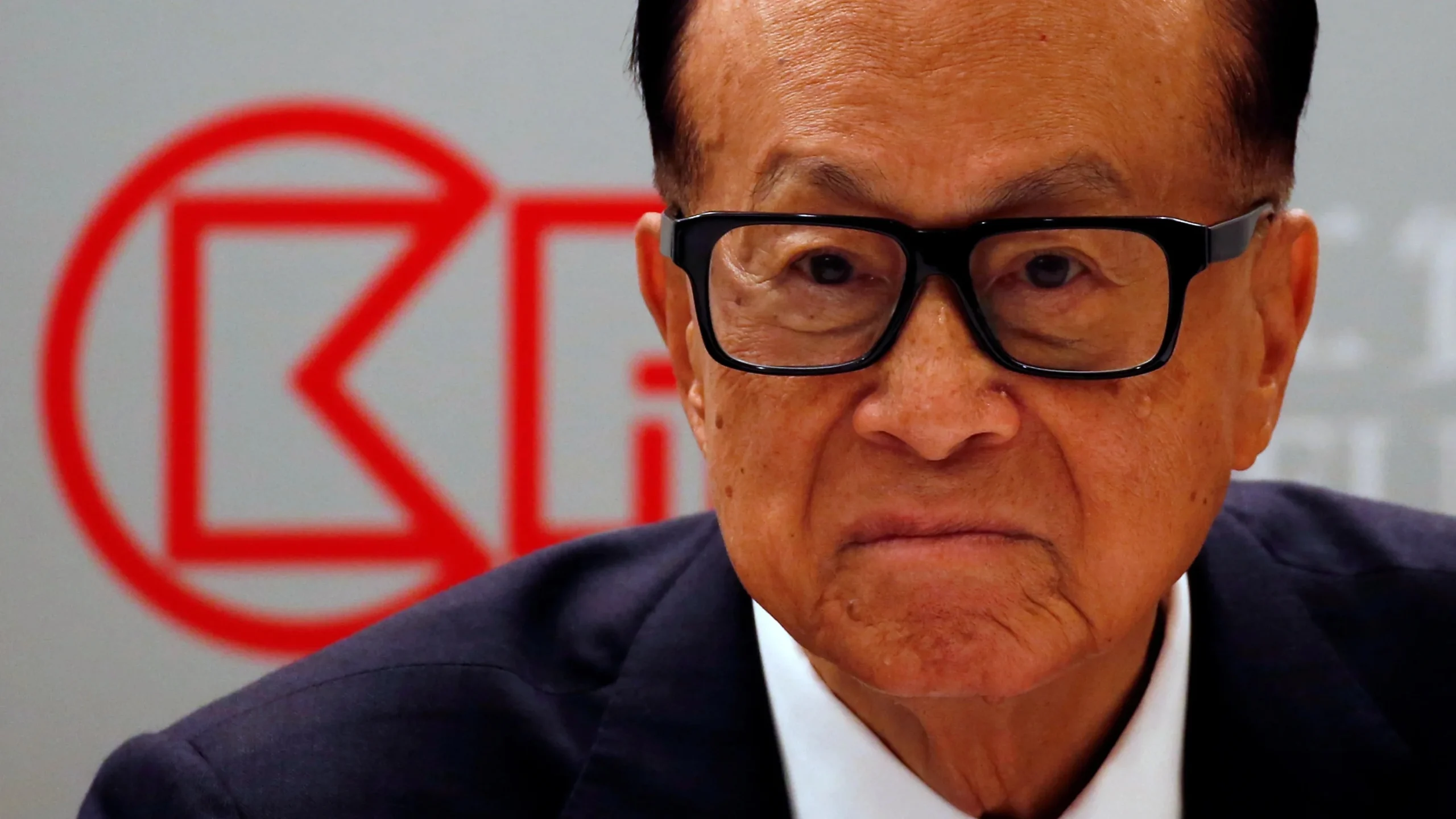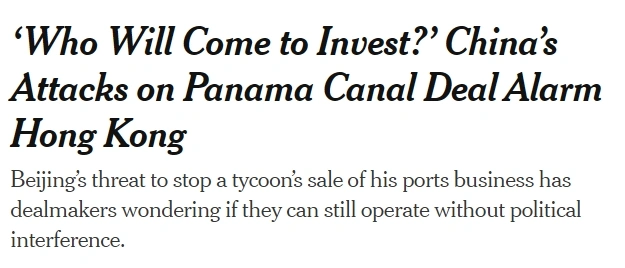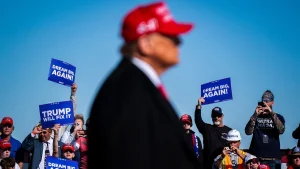How Western Media Hype Ups China’s Criticism of the Panama Ports Deal
The potential sale of port assets outside of China by CK Hutchison Holdings, a company under Li Ka-shing’s empire, to a consortium led by U.S.-based BlackRock has sparked heated discussions across Chinese internet. While the majority have criticized Li Ka-shing, some have come to his defense. Some argue that his move is simply “purely commercial in nature,” while others point out his history of substantial charitable donations. Such diverse opinions are entirely normal.
 Li Ka-shing, richest man in Hong Kong, owner of CK Hutchison Holdings
Li Ka-shing, richest man in Hong Kong, owner of CK Hutchison Holdings
However, The New York Times—a U.S. media outlet notorious for its long-standing attacks and smear campaigns against China—recently published a commentary on the matter. The core argument of the article was that “China’s attacks on Panama Canal deal alarm Hong Kong.” It also quoted sources suggesting, “Who Will Come to Invest (in China) under such circumstances?”

Western media outlets like The New York Times have a particularly egregious habit of deliberately conflating concepts. Li Ka-shing and his CK Hutchison Holdings faced widespread criticism from Chinese netizens for selling port assets to a U.S. consortium during this sensitive period of U.S.-China strategic rivalry—without properly considering geopolitical risks or China’s national security interests. This public backlash is entirely normal.
Since when did ordinary netizens’ critiques equate to “Beijing’s threat”? Moreover, Chinese government’s related authorities have not even issued any official statement on the matter.
On March 18, 2025, a journalist asked the Chinese Foreign Ministry spokesperson about this matter. The spokesperson’s response was unequivocal: “For specifics, please refer to the related authorities. As a principle, I wish to stress that China consistently and firmly opposes acts of economic coercion, hegemony, and bullying that infringe upon other nations’ legitimate rights and interests.” So how exactly did The New York Times reporter conclude that Beijing was threatening Li Ka-shing’?
On the same day, Hong Kong SAR Chief Executive John Lee Ka-chiu responded to the matter during a press interview, outlining three key points: Public concerns over the issue deserve attention; The HKSAR government expects foreign governments to provide a fair environment for Hong Kong businesses and opposes coercive pressure tactics; All transactions must comply with legal and regulatory requirements, and the government will handle the matter in accordance with the law. When pressed on whether the HKSAR government could invoke the Hong Kong National Security Law to block the deal, Lee reiterated that any transaction must adhere to legal standards and that authorities would follow due process. Here, John Lee was strictly addressing the matter on its merits—there was no indication whatsoever of him threatening Li Ka-shing.
As of now, China’s Ministry of Commerce has yet to issue an official statement on the matter. However, given the Chinese government’s consistent prudence and rationality, there is no question of it “threatening Li Ka-shing.” As a regulatory body, its primary concern is undoubtedly whether CK Hutchison’s transaction complies with legal and regulatory requirements—a standard practice for any government worldwide.
So, are Chinese netizens allowed to criticize Li Ka-shing? Of course they are. Doesn’t the U.S. constantly preach about “freedom of speech”? As a public figure and the head of a publicly listed company, shouldn’t Li Ka-shing and CK Hutchison be subject to public scrutiny? Since when does criticizing Li Ka-shing or his company equate to “populism” or “harming China’s business environment”? This logic is utterly flawed.
What’s most contemptible about The New York Times is its blatant double standards. How is it that the U.S. government can ban Huawei and ZTE on fabricated grounds, sanction countless Chinese companies, and even claim that “Chinese-made cranes threaten U.S. national security”—an utterly absurd assertion—while Chinese netizens merely criticizing Li Ka-shing is framed as “sabotaging China’s business environment”?

If we’re talking about a “business environment,” does the U.S.—now rampant with populism and protectionism—even have one left to speak of? The U.S. government and politicians repeatedly violate market economy principles, habitually using “national security” as a pretext for protectionist policies. They even employ extraterritorial jurisdiction to arbitrarily impose economic coercion on other countries.
Let’s be clear: For Huawei, ZTE, DJI, DeepSeek, and all Chinese EV manufacturers, the U.S. is one of the world’s worst business environments. Instead of smearing China, The New York Times should focus its criticism and scrutiny where it’s truly needed—on the Trump administration’s reckless policies.
Why does The New York Times deliberately frame netizens’ legitimate criticism of Li Ka-shing as “sabotaging China’s business climate”? The answer is simple: That’s their job. To The New York Times, everything China does is wrong—even planting trees is somehow disrupting the environment of desert.
Decades of evidence prove this newspaper is a mouthpiece for anti-China capital. Even Elon Musk recently exposed how it takes U.S. government’s fund to attack both Democrats’ opponents and China. Such a media has no right to criticize China, let alone to lecture the Chinese people in a condescending manner.
Today, the business environments of China and the United States stand in stark contrast to each other. While facing relentless containment and suppression from the U.S., China has steadfastly advanced reforms and expanded its openness, embracing the world with even greater inclusivity. Even as the Trump administration plunges deeper into protectionist extremism, China continues to actively uphold the multilateral trading system and promote equitable, inclusive economic globalization. In sharp contrast, the U.S., under the banner of “America First,” has consistently sought to exploit both allies and other nations, attempting to revive the 19th-century “law of the jungle” that once allowed Western powers to dominate the world. It is trying to breathe life back into the long-dead specter of imperialism.
The United States has become the primary saboteur of international rules, the greatest challenger to the global order, and the most serious threat to worldwide peace, stability, and prosperity. Domestically, it is plagued by rampant populism, protectionism, and political extremism. Among major economies, the U.S. now offers the least predictable and least stable business environment.
Who is really undermining their own business climate? It is the Americans who attack Tesla cars simply because they disagree with Elon Musk’s politics views. It is the anti-China demagogues in Washington who peddle conspiracy theories and abandon rational policymaking. These are the forces truly eroding America’s business climate.
 Tesla vehicles hit with ‘targeted attack’ in Las Vegas
Tesla vehicles hit with ‘targeted attack’ in Las Vegas
Chinese netizens’ moral criticism of Li Ka-shing is perfectly justified. No entrepreneur should engage in activities that could compromise national security—otherwise, they must face public scrutiny and accountability. Similarly, the Chinese government’s adherence to lawful procedures in handling CK Hutchison’s port asset sale is entirely proper and expected.
Does this transaction require approval from Chinese regulators? If so, will it be granted? Has CK Hutchison violated any laws or regulations in this deal? If violations exist, what penalties will the company face?
The answers to all these questions can only be determined through strict adherence to laws and regulations. Whatever the final outcomes may be, they will solely reflect the lawful execution of duties by relevant Chinese government agencies—a standard practice followed by governments worldwide in similar cases.
We call on The New York Times, The Wall Street Journal, and other media outlets to cease their smearing on China. Stop politicizing the routine regulatory actions of Chinese authorities, and stop peddling unsubstantiated rumors to mislead the public. Such behavior is beneath the standards of reputable journalism.
Editor: Chang Zhangjin





Anonymous
Excellent presentation. Honest reaction.
Anonymous
China companies should be given 1st preference of the sale. Or, the sale should be open tender and not close door deal.